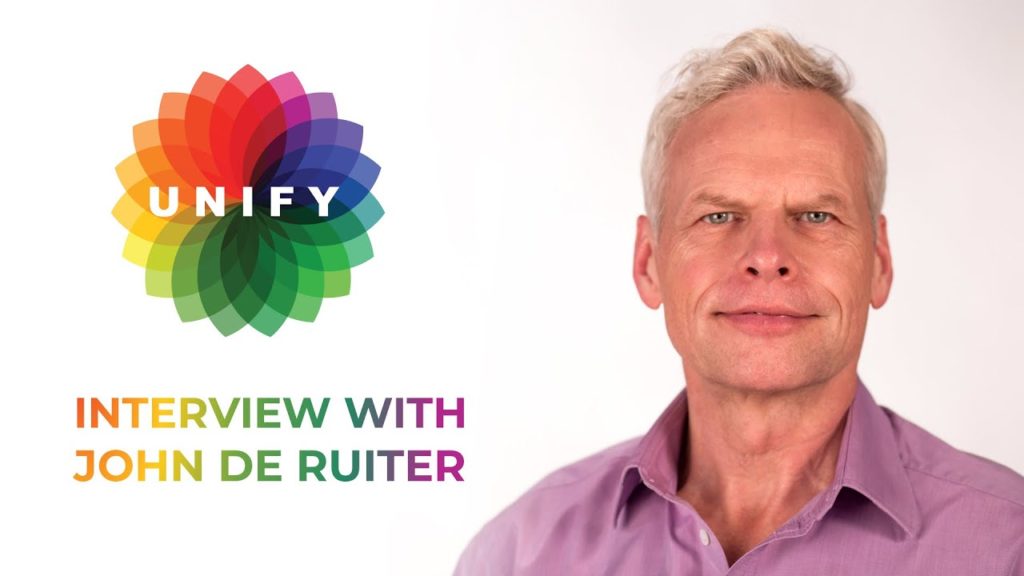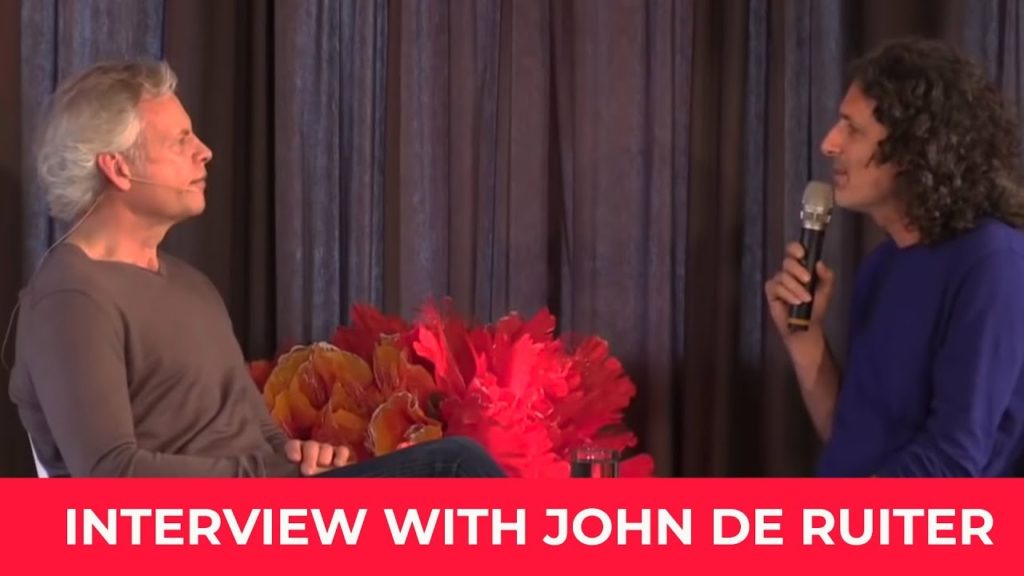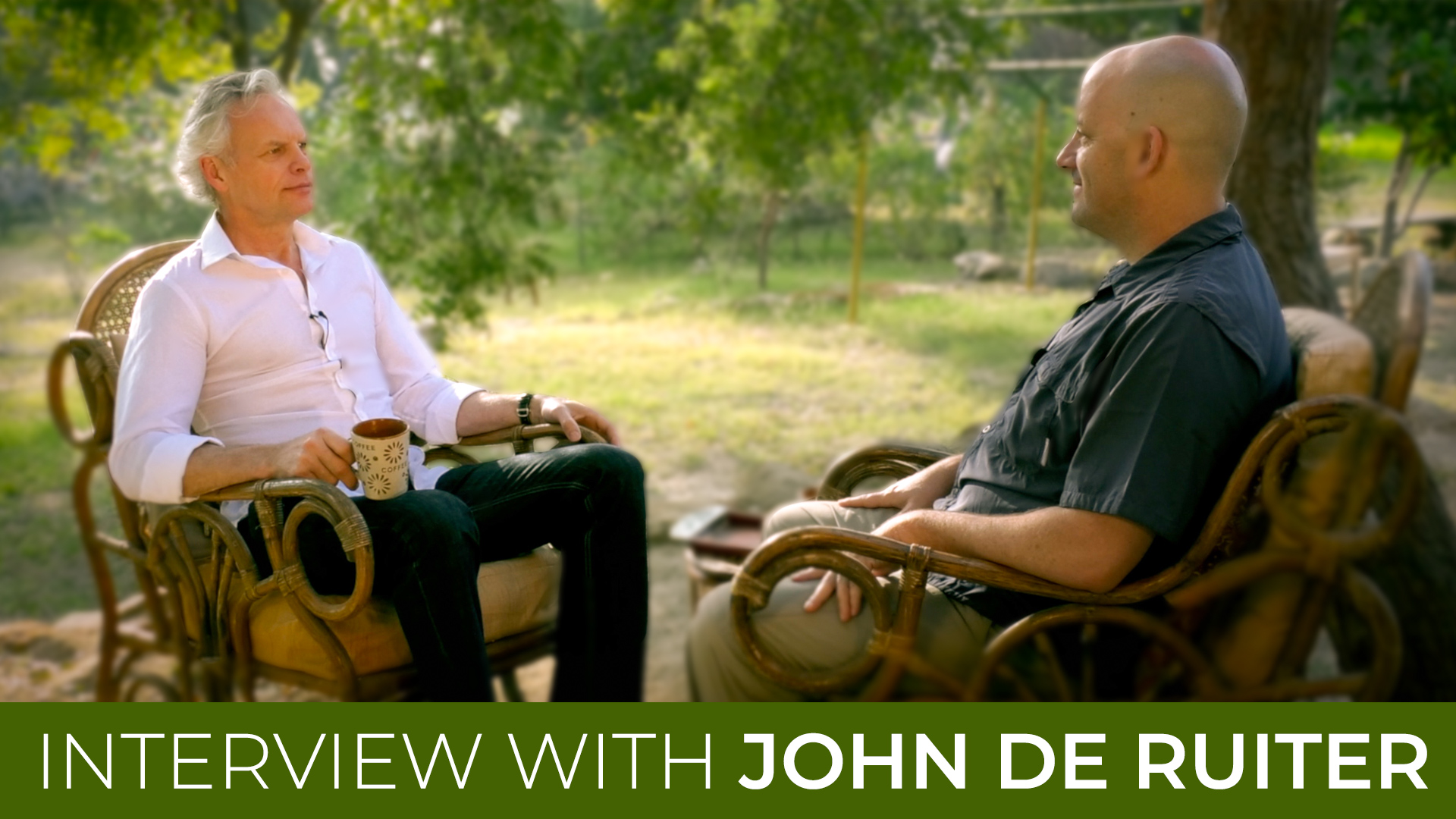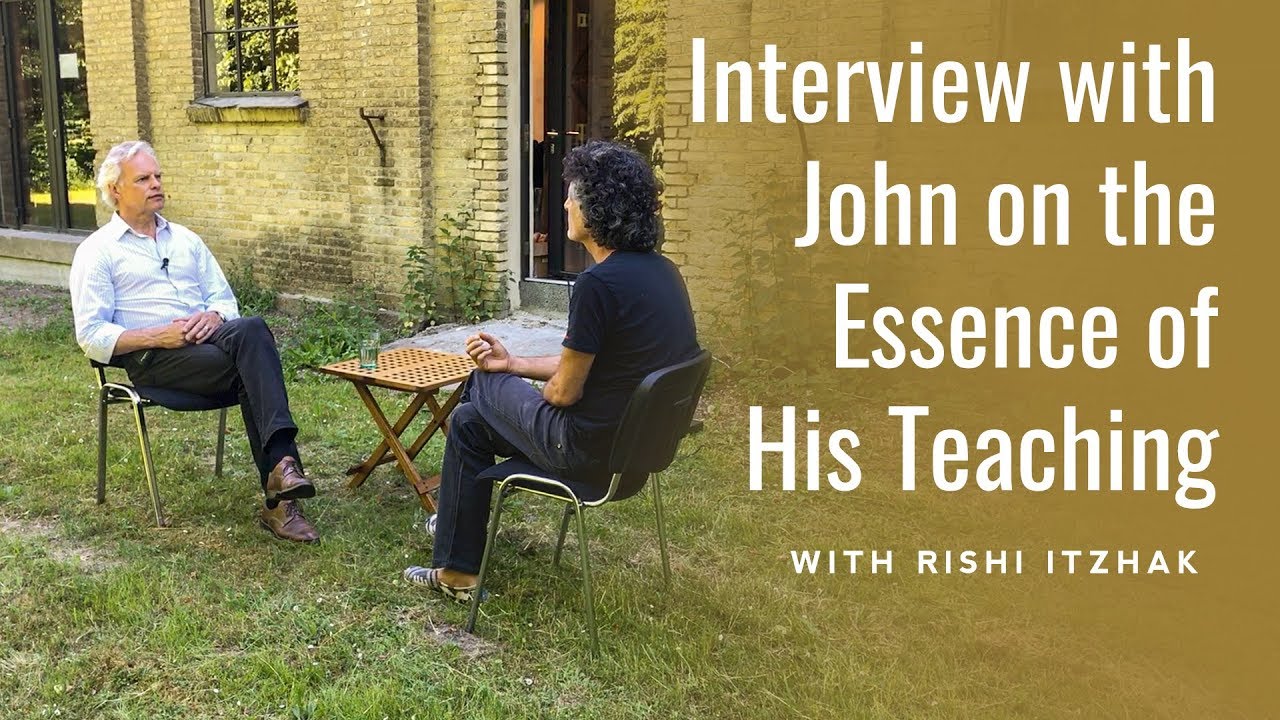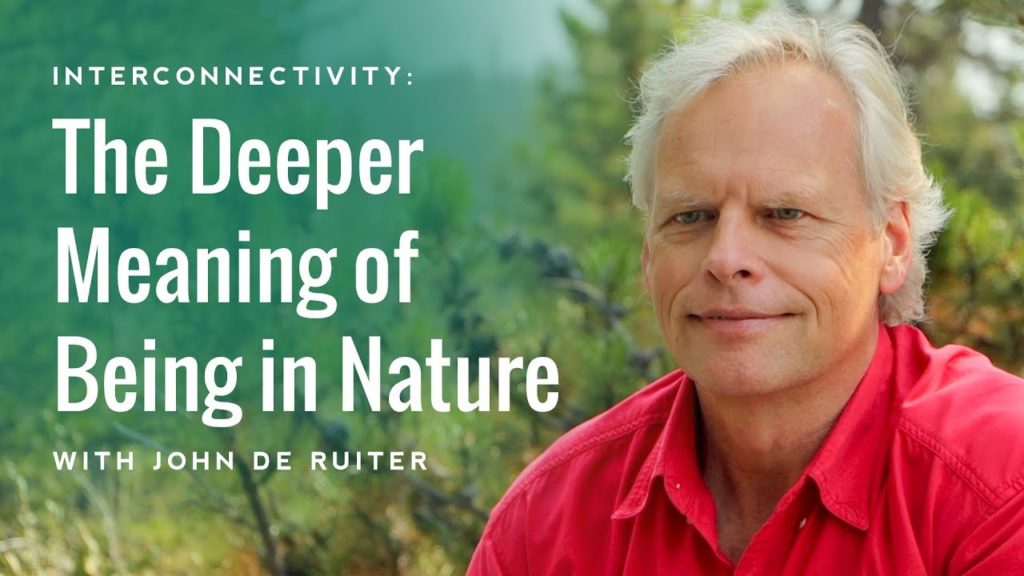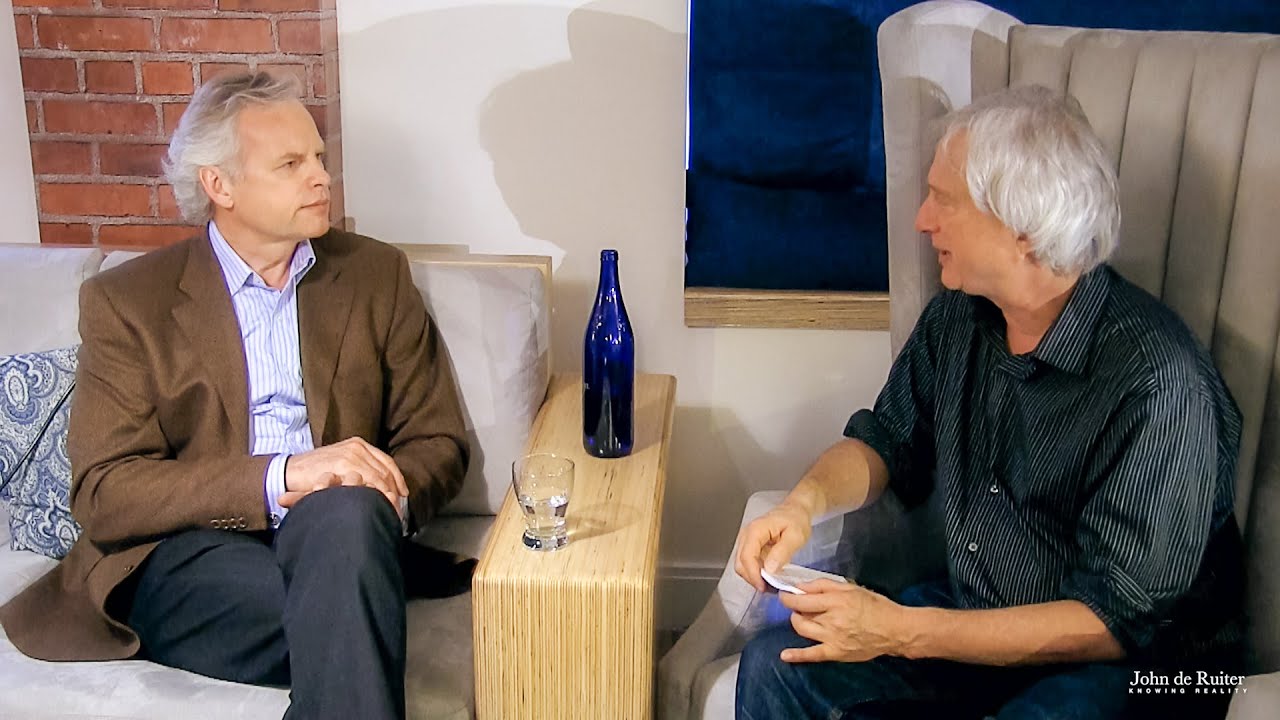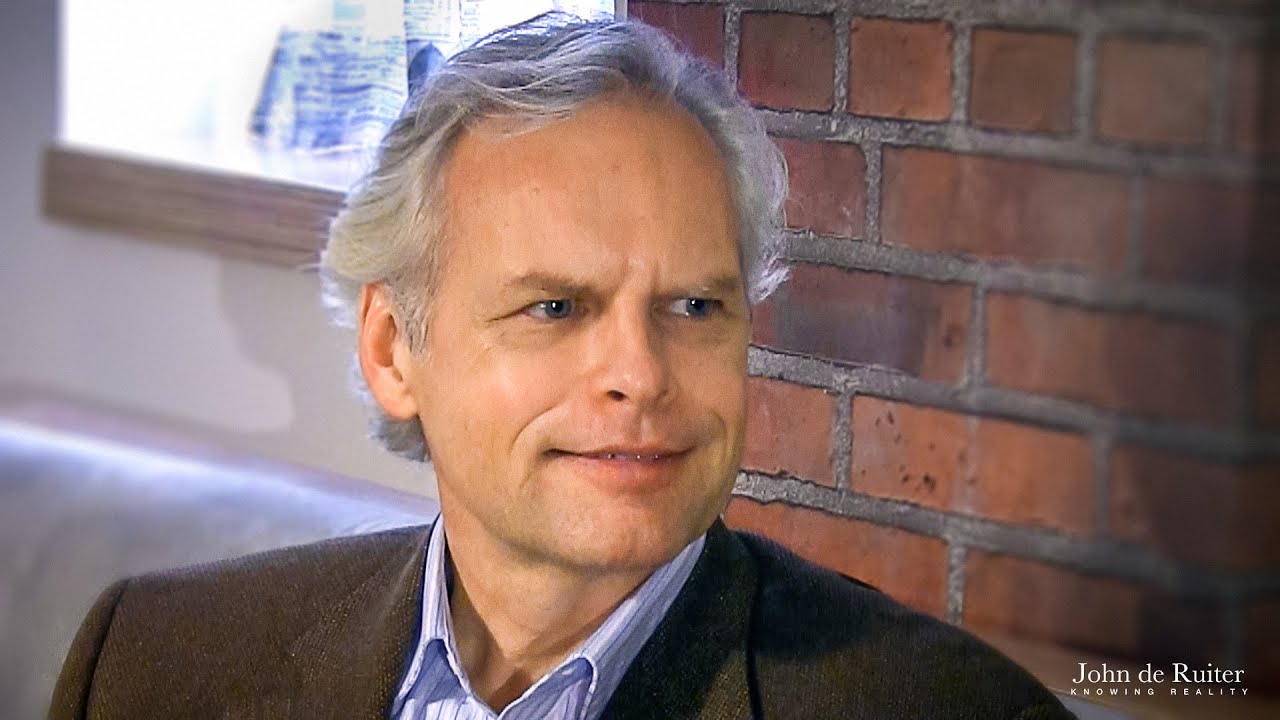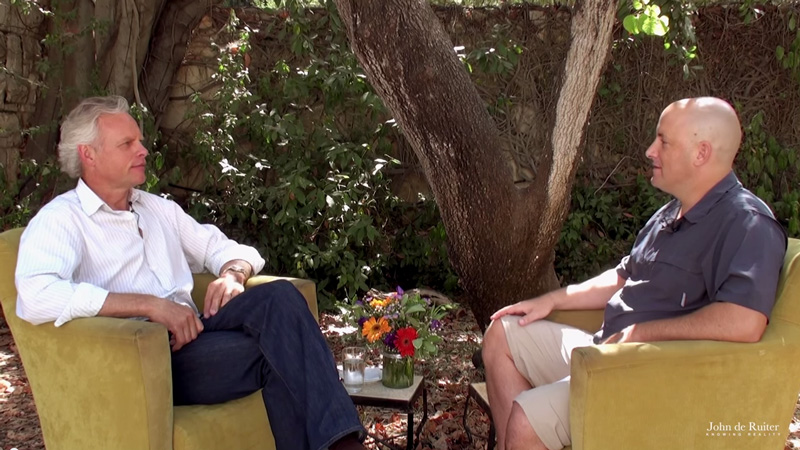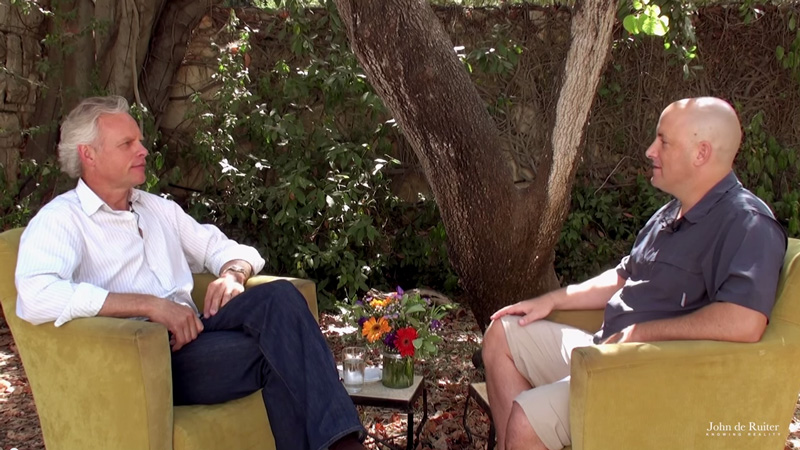Miles Chambers: Yeah, okay this is Lyrical Minded with Milo and it’s that time, it’s that place at 8-10pm on Sunday night and we’ve got an amazing opportunity to talk to John de Ruiter and I hope I’ve pronounced his name correctly but if I haven’t then John will soon correct me. He’s actually going to be talking, coming to Bristol next week, he’s going to be talking between Thursday April 15 and Sunday April the 18th at the Winston Theater, Bristol University, Student’s Union, Queens Road, Clifton. We’re going to talk to him about what he is going to be talking about and my interest is from the angle of words. He’s got a great approach, a great way of looking at words and… but through his philosophy. I’ve been sent a CD, I’ve been sent a book and I’ve read lots of things about him from Pasquale who’s been sending me some information and from Mary. Thank you very much Mary and apparently we’ve got listeners in Canada today and probably all over the world and London who are tuning into the show to hear us talk with John and to hear what he’s got to say. So, hello to all of you out there and this is what I call it poem from the introduction from John’s book, Unveiling Reality. “Waking up is not necessarily pleasant, you get to see why all this time you choose to sleep. When you wake up the first thing you will see is reality does not exist for you, you exist for it. Shocking as it is when you let it in there is rest. You do not have to labour anymore to hold together a reality that does not exist, forcing something to be real that is not real. You and this life you have been living are not real. In letting it in, even though the shock and the pain are shattering there is rest. Reality is when all that you want to know what is true, just so you can let it in and be true. Reality is not a safe place for you, the you that you have created. It is only the place where you would die, where there is no room for your hopes, your dreams. Once you have let it in, once you begin to reawaken, to let reality wake you up, nothing can get it out. That is the beginning of your end. Waking up can be no more painful than the agony of your dream, but waking up is real. There will be integration, a merging of reality in you. You and reality will become one. And in the world that does not accept nor want one but two, you will become a beloved servant instead of a controlling master.” That was John de Ruiter, composed in February 2000 in Edmonton Canada. Now I’m going to try to do a link, a live link to Canada with John right now and if this doesn’t work then we’re going to try another method, lets see if I‘ve got my guest on the other line.
Miles: Hello
John: Hello, Miles
Q: Wow. Okay. Hi John.
John: Hello, Miles.
Miles: Okay. Great, great. We’re there. Can you hear me?
John: Yes, I can hear you .
Miles: Excellent, excellent, excellent, excellent. Now you’re a bit faint here but I’m sure you’re clear going out.
John: Okay, shall I speak up a bit?
Miles: Yes, if you can that’d be great and I’ll turn myself down a bit because I’m really loud .
How’s Canada?
John: Canada is warming up. We’ve just had a little bit of high winds and snow but we’ve got our sun back again.
Miles: I see, yeah of course because you have really amazing summers and really, really cold winters don’t you?
John: Well, that’s right. In the summers we have a lot of broken up skies and blue skies and in the winter it can go down to minus forty.
Miles: Excellent. Well, John I know you haven’t got much time. So I’ve looked at your CD and I’ve looked briefly at your book and I know your speaking in Bristol this weekend. Is that right?
John: Yes.
Miles: Right, and I read one of well, I call them poems, it’s beautifully constructed just after the introduction “Waking Up.” Can you tell me a bit about that poem and what it’s really saying?
John: Waking up is basically coming into recognition and realization of there being an entire interior within and were accustomed to living our existence recognizing that everything is outside of us and in waking up then there’s a coming to terms with what we are within much deeper than even who we are. First it’s recognizing any distortion in what were being of who we are, and as soon as we’ve cleared up that distortion through a profound kind of honesty, then we start to access greater depths within of our interior. And then we start to realize in such an awakening that there is as much within to know as there is outside of ourselves to know.
Miles: I see. Have we only got ten minutes? When you say inside of yourself, what… where are you taking this from, you mean your heart, your mind, your…?
John: Well it’s everything, but it’s not so much the mind because it’s the mind that we’re accustomed to using is one that’s suitable to a self that functions with believing that all of reality is outside of ourselves. So there’s a different kind of use of mind in navigating through our own interior. It’s more of a subtle mind, a subtle use of mind. It’s not using concepts that we’ve learned. It’s moving only by actual awareness of what we know the truth of within and not using anything else. As soon as we move into using something else, then that takes us into a self that relates to things outside of ourselves.
Miles: And how do we know what the truth is within? As Pilot said, “What is Truth?”
John: Well it’s first not even knowing what the Truth is within. It’s just beginning with realizing that we all know that there’s something more within. We don’t know at first what that is or even how to access it, but if there’s an awareness to the fact that we are knowing something and that we know that there is way more within than what we’ve ever encountered. Then just staying with that and staying on that and being completely honest to that. And then one of the things that begins to be realized is that we know almost nothing of what matters most within but, beginning with that resonance within, that there is way more to be known. Staying with that starts to open it, and it’s the profound honesty that really enters into that. We can’t use any of our learning as a self in how to function in this world. That learning doesn’t help us to move within. To move within is to use only the very little bit that we actually really know the truth of.
Miles: Which is?
John: That we know almost nothing of what there is within and as little as that sounds, it’s really quite a significant point, because if you’re assuming knowing the truth of something that you don’t actually know, then that, the belief of that, bars us from our own interior and the awakening into it.
Miles: I see. So the fact that were honest about the little we know is the start of the path?
John: Yes.
Miles: Towards truth.
John: As soon as there’s a recognition of how little we actually know about our own interiors, that causes a profound kind of softening within and an openness within to recognize that most of what we know is nothing. And that creates a different kind of sensitivity and a different kind of awareness that is required to be able to access our own interiors and to move within.
Miles: Right. Okay. Now, I’ve learned a little about you, it says here that at the age of seventeen you were unexpectedly immersed into a depth of reality and is that… is this the first time that you realized this? What happened at seventeen?
John: When I was seventeen I consciously opened up my self and my heart and my mind to realizing that there’s something much more within and without. That there’s something much more to reality than what I’ve ever experienced or perceived or even thought of. And with that kind of a profound opening within, everything of that kind of reality that I didn’t know about, all of the sudden became known. So then I was in the full experience within and without of everything being completely other than what I understood to be real in my accustomed self.
Miles: So, did you know what was happening or was this bizarre? How did you know that what you just said happened, happened? Were you confused or you know…?
John: I knew the Truth of it because of how profoundly deep I was knowing from. The experience was that of an extremely delicate oneness with everything in and everything without, and a recognition and a clarity of realness that surpassed anything that I had ever thought of or heard or imagined. And it was satisfying, not just profoundly, but right to the core. It satisfied every level of being able to know within.
Miles: And you shared this experience with others and want others to experience this? Is that right?
John: At first I didn’t share it with others because it was inconceivable to me that others would be relating to what I had just gone through, so I kept quiet about it and I just went about living as I was living before, but now I knew that I was not the same anymore. People recognized the change and couldn’t understand what the change came from. They just really liked what they were seeing.
Miles: How did you change?
John: It’s just much cleaner, much clearer in my personality, in my self. Having much more direct communication with people. Being much more at ease within and having an ability to move in ways socially and mentally and emotionally that I didn’t have before. So, it was moving into a different level of self or a higher use of self that I wouldn’t have had without such an opening and then walking within that new kind of awareness.
Miles: And this is just, not just, just is the wrong word, but this is something which happened? It wasn’t a lie, it wasn’t a feeling, it wasn’t a physical experience, it’s something which just came across?
John: It’s really all of the above. But even as a physical experience, it’s a different level of sensation than what I was accustomed to at any time before. The level of physical sensation is a very deep level of delicateness. And the delicacies of actually experiencing in such a fine way, within the body, what is recognized as being real and true that is so deeply moving in the heart and in the mind. Whatever you are at present within your body, as awareness, there is going to be sensation to that just by virtue of being in a body.
Miles: Right, so there’s a quote “…absolute surrender within through openness and softness of heart, unfailingly releases the false and leaves behind just the truthful.” What does that mean?
John: The absolute surrender is really, first of all, recognizing that there’s something known within and surrendering into knowing the truth of that. Even if it is… even if what the knowledge is of within, is that your not…you don’t know anything. To surrender to knowing, that is, then takes you out of having to relate to a kind of self that relates mostly to just things outside. As soon as you move into that surrender to knowing how much you don’t know, that puts you in sync with being able to move within.
Miles: Right. Okay. Very interesting. And you’re talking in Bristol. Is that right?
John: I’ll be in Bristol, yes, this coming weekend.
Miles: This coming weekend from Thursday, April the 15th till Sunday, April the 18th and that’s at the Winston Theater Bristol University, and I know that, it’s in Clifton on Queens Road. It’s really nice up there actually. And what is it? 2pm and 7pm meetings?
John: 2pm yes, that’s right in the afternoon and seven in the evening.
Miles: Excellent. I don’t know what time you’ve got. If you could just stay on for five minutes, I’m just got to play a track and I’ve got some words here that have been sent to me which I found very interesting which you’ve got… not your take on them but feelings or reactions to those words, and this is Lyrical Minded, so I just wanted to just ask you a few of those words, you just tell me a reaction to those words, have you got time to do that?
John: Yes.
Miles: Yeah, this is Milo and this is Lyrical Minded still. Honestly, as I promise you and we’ve got in the studio, no not in the studio, well he’s, alright, we have got on the show, he’s not in the studio, he’s actually in Canada. John de Ruiter and I’ll ask him again if I’ve pronounced that name. John I always get names wrong. I shouldn’t say that, i should ask him this actually how i can stop getting names wrong, I’m sure he’d have a concept on that. Yeah, I’ve been talking to him about his concept and philosophy and I’ve read what i call poem or a poem from his book, Unveiling Reality and John de Ruiter is going to be talking this weekend at the Student’s Union. And I’m just asking him, what is he going to be talking about? This is deep stuff, this is the stuff of writings and this is the stuff of poems and songs and late nights scratching away and stories and life, I suppose, and life. So I’m gonna ask John because he’s got some… a reaction to certain words and I’m gonna ask him about that and see how he reacts to those words and what he says. I hope he’s still there. Hello John.
John: Hello Miles. Is it Miles or Milo?
Miles: John, you can call me Milo or Miles. It’s actually, my name is Miles but my nickname is Milo and it’s Milo on the show.
John: Okay, I’ll call you Milo then.
Miles: That was very astute. Did you hear that jingle then?
John: Not really, no.
Miles: Okay, that’s brilliant, that’s brilliant. Have I pronounced your name right?
John: de Ruiter.
Miles: de Ruiter. Okay, okay, is that Dutch? Or?
John: That’s Dutch, yes.
Miles: Right. And that’s where you’re from?
John: Yes.
Miles: Okay. Brilliant, brilliant. We’ve been talking about your philosophy and concepts, very interesting. It’s the type of stuff where you have to think about anything you say for at least ten minutes before you go on to the next sentence but… John, listen, I’ve got some words here and I’d just want to say them to you and see how you react. Is that alright?
John: Yes, that’s fine.
Miles: ‘Okayness.’
John: Okayness is something that’s fundamental to being settled into your interior. Okayness let’s you drop beneath all of your problems, drop beneath your persona. Has you dropping beneath every issue that your relating to as a self to things outside of yourself and okayness leaves you with a very basic, yet deep restedness in the heart.
Miles: Alright, excellent, excellent, excellent. Okay, and ‘real knowledge’?
John: Real knowledge would be that that you actually know the truth of within yourself. There’s a lot of assumed knowledge and learned knowledge, adopted knowledge, but how much real knowledge is actually there is easily found out to be very little. What you really know the truth of within of something that matters on a profound level would be real knowledge.
Miles: And how can you be sure that you’re right about what you say you know?
John: You would know the truth of it because there’s a profound resonance to it first of all.
Miles: Resonance?
John: Also because you would know the truth of it from within your own experience. You know the effect of when there’s an application of real knowledge within or something you really know the truth of in your heart. As soon as you surrender into that and responding to that, it opens up everything else that’s beneath that. It has the most beautiful effect on one’s whole interior.
Miles: In what sense? Interior? Inside, is that a feeling or I’m grasping for evidence as you can see?
John: It immediately accomplishes a healing because there’s a congruency within of what you are as a self and what your interior is made of. There’s a healing and there’s a profound kind of nurture. There’s a settling into what’s experienced as something like nectar within. The entire effect on the interior is one of profound and very dear satisfaction.
Miles: I’m a Christian so I’m coming from… this isn’t actually a religious show, it’s a word show. I believe in the concept of Christianity and whatever they say, you know doing good, sharing and loving… I’m a Christian so I believe in the concept of sharing and goodness and doing right to your fellow man and to yourself. Where does your philosophy fit into that?
John: It would be the same thing.
Miles: Same thing?
John: Yes.
Miles: Is there a God at the head of it? Are you the God or I mean are ‘we’ the God? What would you say about this?
John: Well, I would say that even the word God is sort of too big a word to be using upfront unless you really know the truth of something like that. And if you know the truth of what God is then that’s quite an enormous real knowledge to have. And it’s easy to swing around such large words without really having full presence in it and knowing the truth of it.
Miles: Right. So don’t really use those words until you really understand what God is and what it means to say God.
John: Yes. Or if your going to use that word, you know such words without knowing the truth of them, then you would be using them very light handedly. Not having any strength of opinion in it or rootedness in it, but more of a realization of not really having much in the use of the word.
Miles: I see. Okay, I’ve got one more word and I’m gonna ask you a question after this that I ask all my guests, I hope you don’t mind ‘core splitting honesty’?
John: Gosh, that’s quite a thing. Honesty on it’s own is already a profound concept, whereas something like core splitting honesty is being honest all the way right to one’s core. Which means if there’s a core splitting kind of honesty, then there isn’t anything in which you can be bought. There’s no way at all in which your venal. Then your honesty within really does go all the way to the deepest root. And having such honesty would enable you to move right into your own interior.
Miles: I see. I see. And that is the essence, really?
John: It is, because without that kind of honesty you can start to approach your interior, but as soon as there’s something that causes an apprehension or a fear of what you may see that you don’t want to see, then that will stop your approach within. And then immediately you’ll be obfuscating and hiding what it is that you don’t want to see and making it about something other than what it really is. So then a lie is created just to cover the discomfort. Whereas with core splitting honesty there’s no such distorted activity within. It’s just awareness going straight in.
Miles: It’s difficult to do that. Really, really difficult to be absolutely honest with yourself in every way from inside. I mean just that thought alone could spend the next two years, five years struggling to do that. And have you found that? Are you at that stage?
John: Well it’s not difficult to be that honest within. It could be said that it’s very difficult to not be that honest within because every step you make you have to cover some measure of dishonesty within the step. So there will be a mix in everything, so you’re always having to cover for yourself and explain yourself in a way that is less than accurate. So there’s a lot of energy in putting forward a projection of yourself that isn’t accurate to what you actually and honestly are at present within.
Miles: John, I’d love to talk more. I’ve got a question to ask and I know that your pressed for time because it’s ten to nine here and I know it’s ten to two in Canada and you’ve got a meeting to go to.
John: Yes.
Miles: But, what I wanted to ask you, and I’ll just ask you it, and you can react to it obviously as truthfully as you want to, and I wasn’t honest because I said we’d be back in two minutes and I spent longer than two minutes. So I’ve got to work on that. If you had power for one hour, what would you do?
John: Exactly what I’m doing now.
Miles: Which is?
John: Moving within the very core of my interior and coming from that in how I am toward others and doing what I can to meet people from an actual intimacy of being.
Miles: Excellent, excellent, excellent. Great. And I’ll say again, you can catch John, not catch, he’ll be there for four days, from Thursday April the 15th to Sunday April the 18th at the Student’s Union, Winston Theater. I think it’s on the third floor, second floor. Queens Road in Clifton and the meetings will be held at 2pm and 7pm, this weekend coming so you’ve got plenty of time. And that was great, that was great. Lots of thoughts around there. I can feel a poem a brewing. John thanks so much.
John: Thank you so much as well, Milo. It’s been a pleasure talking to you.
Miles: I’d like to thank Pasquale and Mary and Carla and Tim as well for sorting this all out and the phone calls we were making, the text messages and the books that got sent, you know, in 24 hours. Brilliant, brilliant. I hope to see… I’m going to come up the weekend and get some more. It seems like you can chuck any question at you and you’ve got a profound answer. That’s great, that’s great, that’s great.
John: Well, it’ll be nice to meet you then.
Miles: I mean, do people do that in the meetings? Can they just come up and ask you a question? Is that how it works?
John: People come up to a questioners chair and take the microphone, as I have my own, and then we engage in a dialogue.
Miles: I know it’s the… I was watching a CD, and I’ll let you go now, and you took at least 10 seconds to answer and I was thinking how is he going to have an interview on the radio like that. What was that about?
John: Yes, well it’s different when I’m speaking to someone in person, in a meeting. They’ll ask a question and then I’ll proceed not directly into answering the question but to meeting them on a profound level. So within that connection there’s really a lot happening, even though on the surface things are quiet for ten seconds first.
Miles: All right, interesting, very interesting. Well John, its absolutely great. Thanks for taking the time. I know you’ve got a meeting, and you’re a very busy man, to go to. And it’s been great to have you on the show and to briefly discuss what we discussed and look at those words. That was great and hopefully I’ll see you at the weekend.
John: Okay.
Miles: Okay. Thank you.
John: Bye Milo. Take care.
Miles: Okay, you too, bye.

